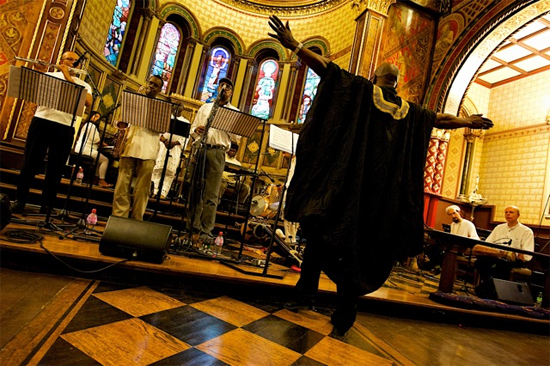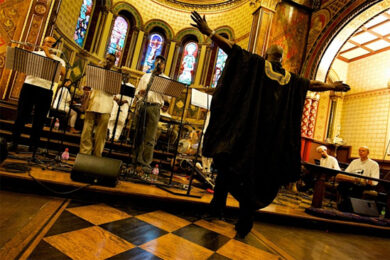"During the year 1957, I experienced, by the grace of God, a spiritual awakening which was to lead me to a richer, fuller, more productive life. At that time, in gratitude, I humbly asked to be given the means and privilege to make others happy through music. I feel this has been granted through his grace."
Speaking in the sleeve notes to his seminal opus A Love Supreme, John Coltrane was describing an inner search that resulted in an epiphany that his wife Alice recalled to writer Ashley Kahn: "There was an unoccupied area in the house where we hardly ever went. John would go up there, take little portions of food every now and then, spending his time pondering over the music he heard." Reappearing one day Coltrane and jazz were changed forever. "It was like Moses coming down from the mountain. It was so beautiful," she continued. "He walked down and there was that joy, that peace in his face, tranquility. He said ‘This is the first time that I have received all of the music for what I want to record’."
That music was A Love Supreme – a suite in four parts dedicated to God. It was to be recorded at Rudi Van Gelder’s legendary studio in the winter of 1964, and the result was an album of deep spiritual and creative intensity that saw its composer stepping apart from the hip jazz elite, in what Kahn called "a public spiritual disrobing". Stripped of ego, what Coltrane was mining was something purer and deeper. And those vibrations continue to resonate today.
Nearly 50 years on from this monumental recording, on the evening of the summer solstice, we are sitting in the suitably celestial setting of King’s College Chapel off London’s Strand for a re-envisioning of A Love Supreme. Curated by Paul Bradshaw, former publisher and editor of Straight No Chaser magazine, and scored by flautist Rowland Sutherland, the performance was to include a multi-cultural ensemble of some of London’s finest jazz players directed by marimba and vibraphone virtuoso Orphy Robinson.
A Love Supreme is Coltrane’s best-known album and it continues to ride an ever – ascending path of reverence. There have been diverse recordings, from Branford Marsalis to the Turtle Island string quartet, conventional tributes at venues like the Lincoln Centre, as well as the weekly liturgy at St John Coltrane African Orthodox Church in San Francisco. That said, overall, there have been surprisingly few attempts to really explore and experiment with Coltrane’s inspired vision in its totality.
Tonight’s performance is to be one of the first to really attempt that. In doing so it will take its cue both from the expansive direction Coltrane’s music was taking before his untimely death in 1967, and the musical dedications of Alice Coltrane whose Eastern meditations on jazz were the result of her own spiritual quest following the death of her husband. But perhaps the biggest inspiration was the live recording of A Love Supreme at the Antibes Jazz Festival in 1965. This was certainly one path that Rowland Sutherland was exploring when he first imagined how the group should approach this daunting task.
"When John Coltrane wrote A Love Supreme in 1964 it was a period of great turmoil. America was still in shock from the assassination of John F Kennedy. 200,000 people had descended on Washington DC to protest about civil rights and the shadow of the Vietnam War loomed large," explained Paul Bradshaw prior to introducing the band. Speaking thoughtfully to a hushed audience, he further sought to locate this "re-envisioning" in today’s equally troubled world, but a world where Coltrane’s belief in a supreme love can help unify our own inner cities.
Entering individually and with some reverence from the back of the chapel, the white clothed ensemble take to the stage in front of the chapel’s stain glass windows and beneath a beautiful gold mosaic of Christ. When the vibrating drone of the tamboura from seated percussionist Ansuman Biswas rises up to meet the sparkling kora of Mosi Conde, the stage is set for a deep and spiritual performance. John Coltrane’s genius lay in the way he combined the fire with the sublime, tension with release. With the meditative intro building around Sutherland’s flute before the tenor sax of Steve Williamson and bass clarinet of Shabaka Hutchings unite with force, it’s clear this is to be both a soothing and fierce ride.
Prior to the concert Paul Bradshaw had referred to Wynton Marsalis comments about approaching Coltrane’s work: "You don’t try and play what Trane played," Marsalis said. "I’m not trying to be up there wasting musical time idol-worshiping.’ And as the first powerful wave of the full ensemble rises up to disturb the calm of this most peaceful setting, the respect for Coltrane’s original work is clearly matched by the same kind of inquisitive search he pursued. One of the first jazzmen to look East, Coltrane was also exploring African rhythms on LPs like Kulu Se Mama. So the interaction here tonight between the Bata drums and assorted Eastern instruments is both profound and thought provoking. Where indeed would Coltrane have taken this work, if he had returned to it later in life? For example, how would he have responded to the electronic impulse of the late 60s? This was a question posed tonight by Pat Thomas who is particularly creative and effective when working his electronic pulsations against Nikki Yeoh’s searching piano.
Listen back to the Antibes concert and the first thing that hits you is the ferocity of Coltrane’s horn. It’s certainly something Williamson and Hutchings strive for tonight with some incredibly forceful duets, as newly composed parts from Sutherland combine with the original themes to stunning effect.
When Orphy Robinson, sporting a black and gold African gown, steps from behind his marimba to conduct the mighty noise of the ensemble, the power and the glory is truly breathtaking. Holding the whole piece together is the narration of Juwon Ogungbe. He intoned the words of Alice Coltrane’s guru, Swami Satchidananda, on the opening section, ‘Acknowledgement’, and recited Coltrane’s devotional poem in the final section, ‘Psalm’, bursting into deep song, his words in Yoruba, to compliment the rising swell of the ensemble. As Orphy Robinson signals for the musical swell to subside after an hour of intense yet profoundly moving music, the words of Coltrane provide a suitable description of what we have just witnessed: "Elation, Elegance, Exaltation".



